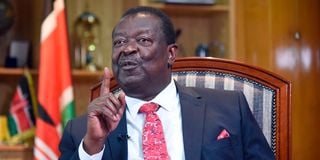Why Mudavadi's first trip to Beijing carries greater symbolism

Prime Cabinet Secretary Musalia Mudavadi.
What you need to know:
- Mudavadi's office has become central to economic diplomacy to smooth relations with countries that are important to Kenya's trade.
- Shortly before President Ruto won the election, he had been critical of China's debt and once mocked Beijing at a campaign rally.
Prime Cabinet Secretary Musalia Mudavadi's trip to Beijing this week may be more significant than just a New Year visit to China.
A dispatch from Beijing says Mudavadi, who is also Kenya's Cabinet Secretary for Foreign Affairs and Diaspora, is travelling “at the invitation of Member of the Political Bureau of the CPC Central Committee and Minister of Foreign Affairs Wang Yi.”
But this is a kind of quid pro quo with Wang, who was here in July last year, well before Mudavadi took over the Foreign Affairs portfolio in October.
The Cabinet Secretary's office in Nairobi said the three-day trip from Tuesday “presents a valuable opportunity for the Prime CS and CS for Foreign and Diaspora Affairs to follow up on the discussions and agreements established between Kenya and China during the recent state visit by HE President William Ruto.”
Under President Ruto's one-government approach, Mudavadi's office has become central to economic diplomacy to smooth relations with countries that are important to Kenya's trade or with which Kenya has important economic relations such as public debt, foreign direct investment and infrastructure financing.
A dispatch said Mudavadi’s trip would see him “actively engage with senior government representatives of the People’s Republic of China, focusing on bolstering collaboration in trade, investment, and security.”
The identities of these officials were not disclosed, but Wang is expected to be among them.
Although China is one of Kenya's largest bilateral creditors, it could continue to be Nairobi's go-to country if Kenya continues with its projects.
Mudavadi's office acknowledged before the trip that Beijing remains an important partner for Nairobi, “at the forefront of impactful infrastructure projects, significantly enhancing the lives of many Kenyans.”
Some projects are still pending. These include extending the standard gauge railway, upgrading the Nairobi-Nakuru highway and building a new passenger terminal and runway at Jomo Kenyatta International Airport.
But whether any of these projects will be funded at all depends on whether relations between the two sides can be smoothed out.
Shortly before President Ruto won the election, he had been critical of China's debt and once mocked Beijing at a campaign rally.
Once in power, some of his ministers caused a diplomatic row by targeting Chinese companies in the country.
A protest in Beijing calmed Nairobi, but President Ruto has since admitted that the national debt is the biggest headache he faces on a daily basis.
However, on his first trip to Beijing in October, Ruto had reversed his speeches on China, seeing it as important to his Bottom-Up Economic Transformation Agenda.
“We agreed on creating a conducive environment for Chinese companies that will undertake projects including road construction, railway expansion and airport modernisation,” Ruto said after meeting senior officials of the Chinese Communist Party in October in Beijing, on the sidelines of a Belt and Road Initiative Forum.
After the forum, Nairobi announced a number of infrastructure and ICT MoUs, although the biggest announcements on the SGR were never realised.
Mudavadi's trip could improve the channels of communication that were almost damaged during Ruto's first year in office.
And at least the people-to-people links have not yet been severed.
Last week, President Xi Jinping responded to a letter written to him by Kenyan students.
And he spoke of the Belt and Road projects such as the SGR, which he described as a “grand blueprint of the China-Kenya comprehensive strategic cooperative partnership.”
“It is hoped that you can learn professional knowledge well, continue the traditional friendship, devote yourself to bilateral cooperation, tell stories of China-Africa friendship, and make greater contributions to the building of a high-level China-Africa community with a shared future," Xi said in a response to a letter written by Kenyan students and alumni at Beijing Jiaotong University.
In December, Mudavadi had also spoken of reaching out to Chinese investors.
“We look forward to having more investors from China coming here and making this their launch pad for investments in the region," Mudavadi said at a function to mark 60 years of diplomatic relations with China.
"If we want to improve the lot of our people, we must engage robustly with the people of China.”




